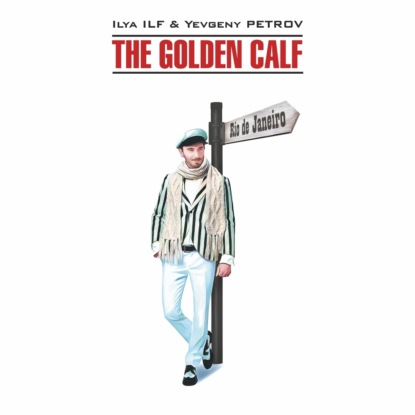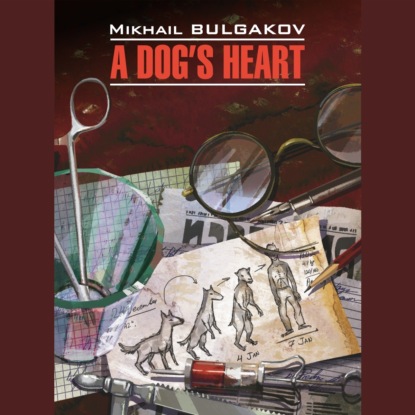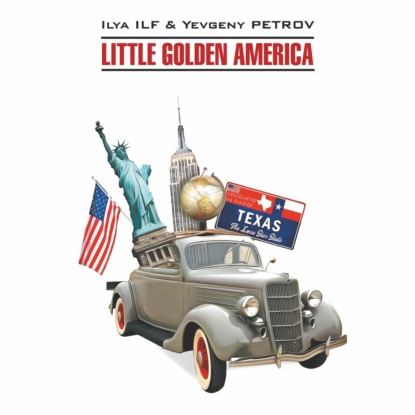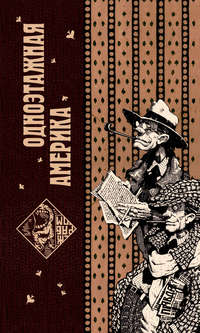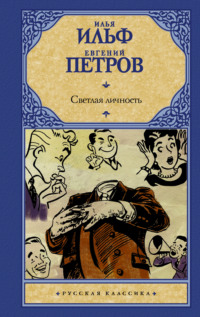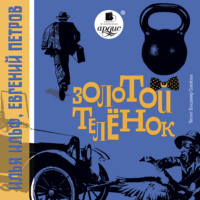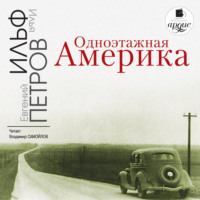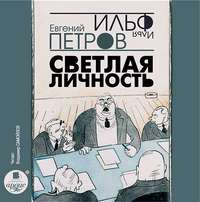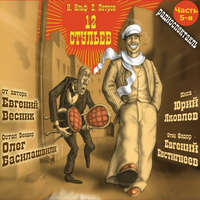
Полная версия
Золотой теленок / The Golden Calf
In the print shop, however, the commission saw the work going full-speed ahead. Purple lights shone; flat printing presses busily flapped their wings. Three of them produced the gorge in black-and-white, while the fourth, a multi-color machine, spewed out postcards: portraits of Douglas Fairbanks with a black half-mask on his fat teapot face, the charming Lya de Putti, and a nice bulgy-eyed guy named Monty Banks.
Portraits flew out of the machine like cards from a sharper’s sleeve. That memorable evening was followed by a long series of public trials that were held in the open air of the gorge, while Alexander Ivanovich added a half-million rubles to his assets.
His shallow, angry pulse was as impatient as ever. He felt that at that moment, when the old economic system had vanished and the new system was just beginning to take hold, one could amass great wealth. But he already knew that striving openly to get rich was unthinkable in the land of the Soviets. And so he looked with a condescending smile at the lonely entrepreneurs rotting away under signs like: GOODS FROM THE WORSTED TRUST B. A. LEYBEDEV, BROCADE AND SUPPLIES FOR CHURCHES AND CLUBS, or GROCERIES, X. ROBINSON AND M. FRYDAY.
The pressure from the state is crushing the financial base under Leybedev, under Fryday, and under the owners of the musical pseudo co-op “The Bell’s A-Jingling.”
Koreiko realized that in these times, the only option was to conduct underground commerce in total secrecy. Every crisis that shook the young economy worked in his favor; every loss of the state was his gain. He would break into every gap in the supply chain and extract his one hundred thousand from it. He traded in baked goods, fabrics, sugar, textiles – everything. And he was alone, completely alone, with his millions. Both big- and small-time crooks toiled for him all across the country, but they had no idea who they were working for. Koreiko operated strictly through frontmen. He alone knew the entire length of the channels that ultimately brought money to him.
* * *At twelve o’clock sharp, Alexander Ivanovich set the ledger aside and prepared for lunch. He took an already peeled raw turnip out of the drawer and ate it, looking straight ahead with dignity. Then he swallowed a cold soft-boiled egg. Cold soft-boiled eggs are quite revolting; a nice, good-natured man would never eat them. But Alexander Ivanovich wasn’t really eating, he was nourishing himself. He wasn’t having lunch; he was performing the physiological process of delivering the right amounts of protein, carbohydrates, and vitamins to his body.
Herculeans usually capped their lunch with tea, but Alexander Ivanovich drank a cup of boiled water with sugar cubes on the side. Tea makes the heart beat harder, and Koreiko took good care of his health.
The owner of ten million was like a boxer who is painstakingly preparing for his triumph. The fighter follows a strict regimen: he doesn’t drink or smoke, he tries to avoid any worries, he practices and goes to bed early – all with the aim of one day jumping into the glittering ring and leaving a jubilant winner. Alexander Ivanovich wanted to be young and fresh on the day when everything came back to normal, when he could emerge from the underground and open his plain-looking suitcase without fear. Koreiko never doubted that the old days would return. He was saving himself for capitalism.
And in order to keep his second, true life hidden from the world, he lived like a pauper, trying not to exceed the forty-six rubles a month he was paid for the miserable and tedious work he did beside the nymph- and dryad-covered walls of the Finance and Accounting Department.
Chapter 6. The Gnu Antelope
The green box with the four con artists went flying in leaps and bounds along the dusty road. The car was subjected to the same natural forces that a swimmer experiences during a storm. It would be suddenly thrown off track by an unexpected bump, sucked into a deep pothole, rocked from side to side, and showered with sunset-red dust.
“Listen, young man,” said Ostap to the new passenger, who had already recovered from his recent misadventure and was sitting next to the captain as if nothing had happened. “How dare you violate the Sukharev Pact? It’s a respectable treaty which was approved by the League of Nations Tribunal.”
Panikovsky pretended he didn’t hear and even looked the other way.
“And in general, you play dirty,” continued Ostap. “We have just witnessed a most unpleasant scene. The people of Arbatov were chasing you because you took off with their goose.”
“Miserable, wretched people!” mumbled Panikovsky angrily.
“Really?” said Ostap. “And you are, apparently, a public health physician? A gentleman? Keep in mind, though, that if you decide to make notes on your cuffs like a true gentleman, you’re going to have to use chalk.”
“Why is that?” asked the new passenger grumpily.
“Because your cuffs are pitch black. That wouldn’t be dirt, by any chance?”
“You’re a miserable, wretched man!” retorted Panikovsky quickly.
“You’re saying this to me, your savior?” asked Ostap gently. “Adam Kazimirovich, could you stop the car for a moment? Thank you kindly. Shura, my friend, would you please restore the status quo?”
Balaganov had no idea what “status quo” meant, but he took his cue from the tone with which these words were uttered. With a nasty smile on his face, he put his hands under Panikovsky’s arms, pulled him out of the car, and lowered him onto the road.
“Go back to Arbatov, young man,” said Ostap dryly. “The owners of the goose can’t wait to see you there. We don’t need boors here. We are boors ourselves. Let’s go.”
“It won’t happen again!” pleaded Panikovsky. “My nerves are bad!”
“Get on your knees,” said Ostap.
Panikovsky instantly dropped on his knees, as if his legs had been cut out from under him.
“Good!” said Ostap. “I find your posture satisfactory. You are accepted conditionally, until the first violation, as the new Girl Friday.”
The Antelope re-admitted the chastened boor and went rolling on again, swaying like a hearse.
Half an hour later, the car turned onto the big Novozaitsev highway and, without slowing down, entered a village. People were gathered near a log house with a crooked and knotty radio mast growing from its roof. A clean-shaven man stepped out of the crowd resolutely, a sheet of paper in his hand.
“Comrades!” he shouted sternly, “I now declare our meeting of celebration open! Allow me, comrades, to consider your applause…”
He had evidently prepared a speech and was already looking at his paper, but then he realized that the car wasn’t stopping and cut it short.
“Join the Road Club!” he said hastily, looking at Ostap, who was just then riding past him. “Let’s mass-produce Soviet motorcars! The iron steed is coming to replace the peasant horse.”
And then, as the car was already speeding away, he blurted out the last slogan over the congratulatory rumble of the crowd:
“The car is not a luxury but a means of transportation!”
With the exception of Ostap, all the Antelopeans were somewhat unnerved by this elaborate reception. Not knowing what to make of it, they fidgeted in the car like little sparrows in their nest. Panikovsky, who generally disliked large gatherings of honest people, crouched on the floor just in case, so that the villagers could see only the dirty top of his straw hat. Ostap, on the other hand, was totally unfazed. He took off his white-topped cap and acknowledged the greetings by nodding left and right with dignity.
“Improve the roads!” he shouted as a farewell. “Merci for the reception!”
The car was back on the white road cutting though a large, quiet field.
“They’re not going to chase us?” asked Panikovsky anxiously. “Why the crowd? What happened here?”
“These people have never seen an automobile before, that’s all,” said Balaganov.
“Continuing our discussion,” commented Ostap. “Let’s hear from the driver. What’s your assessment, Adam Kazimirovich?”
The driver thought for a moment, sounded the maxixe to shoo off a silly dog that had run into the road, and allowed that the crowd had gathered to celebrate a local church holiday. “Holidays of this nature are common among country people,” explained the driver of the Antelope.
“Right,” said Ostap. “Now I know for sure that I’m in the company of unenlightened people. In other words, bums without university education. Children, dear children of Lieutenant Schmidt, why don’t you read newspapers? One must read newspapers. They quite often sow the seeds of reason, good, and the everlasting.”
Ostap pulled a copy of Izvestiya out of his pocket and loudly read to the crew a short article about the Moscow – Kharkov – Moscow auto rally.
“We are now on the route of the rally,” he said smugly, “roughly one hundred miles ahead of its lead car. I suppose now you understand what I’m talking about?”
The low-ranking Antelopeans were quiet. Panikovsky unbuttoned his jacket and scratched his bare chest under his dirty silk tie.
“So you still don’t get it? Apparently, even reading newspapers doesn’t help in some cases. Fine, I’ll give you more details, even though it goes against my principles. First: the peasants thought the Antelope was the lead car of the rally. Second: we don’t deny it. Moreover, we will appeal to all organizations and persons for proper assistance, underscoring the fact that we are the lead car. Third… Oh well, the first two points should be enough for you. It’s abundantly clear that we will keep ahead of the rally for a while and will milk, skim off, and otherwise tap this highly civilized undertaking.”
The grand strategist’s speech made a huge impression. Kozlevich looked at the captain with admiration. Balaganov rubbed his wild red locks with his palms and laughed uncontrollably. Panikovsky shouted “Hooray!” in anticipation of worry-free looting.
“All right, enough emotion,” said Ostap. “On account of the falling darkness, I now declare the evening open. Stop!”
The car stopped, and the tired Antelopeans climbed out. Grasshoppers hopped around in the ripening crops. The passengers were already seated in a circle near the road, but the old Antelope was still huffing and puffing, its body creaking here and there and its engine rattling occasionally.
The novice Panikovsky made such a large fire that it seemed like a whole village was ablaze. The wheezing flames blew in all directions. While the travelers fought the pillar of fire, Panikovsky bent down and ran into the fields, returning with a warm, crooked cucumber in his hand. Ostap promptly snatched the cucumber from him, saying:
“Don’t make a cult out of eating.”
Then he ate the cucumber himself. They dined on the sausage that the practical Kozlevich brought from home and went to sleep under the stars.
“And now,” said Ostap to Kozlevich at sunrise, “get ready. Your mechanical tub has never seen a day like this before, and it will never see one like this again.”
Balaganov grabbed a small bucket, that was inscribed “Arbatov Maternity Hospital,” and ran to the river to fetch some water. Adam raised the hood of the car, squeezed his hands into the engine, and, whistling along, started fiddling with its little copper intestines. Panikovsky leaned against the spare wheel and stared pensively and unblinkingly at the cranberry-colored sliver of sun that had appeared above the horizon. The light revealed a multitude of small age-related details on his wrinkled face: bags, pulsating veins, and strawberry-colored splotches. This was the face of a man who had lived a long, honorable life, has adult children, drinks healthy acorn coffee in the morning, and writes for his organization’s newsletter under the pen name “The Antichrist.”
“Panikovsky,” asked Ostap suddenly, “do you want to hear how you’re going to die?”
The old man flinched and turned toward him.
“It’ll be like this. One day, when you return to a cold, empty room at the Hotel Marseilles – which will be in some small town where your line of work takes you – you’ll start feeling sick. One of your legs will be paralyzed. Hungry and unshaven, you will lie on a wooden bench, and nobody will come to see you, Panikovsky, nobody will feel sorry for you. You didn’t have kids because you were too cheap, and you dumped your wives. You will suffer for an entire week. Your agony will be horrible. Your death will be slow, and everyone will be sick and tired of it. You will not be quite dead yet when the bureaucrat in charge of the hotel will already be requesting a free coffin from the municipal authorities… What is your full name?”
“Mikhail Samuelevich,” replied the stunned Panikovsky.
“…requesting a free coffin for Citizen M. S. Panikovsky. But don’t cry, you’ll still last for a couple of years. Now back to business. We need to take care of the promotional and educational aspects of our campaign.”
Ostap pulled his doctor’s bag out of the car and put it down on the grass.
“My right hand,” said the grand strategist, patting the bag on its fat sausage-like side. “Everything that an elegant man of my age and ambition might possibly need is right here.”
Bender squatted over the bag like an itinerant Chinese magician and started pulling various objects out of it. First he took out a red armband with the word “Administrator” embroidered on it in gold. It was joined on the grass by a policeman’s cap with the crest of the city of Kiev, four decks of playing cards with identically patterned backs, and a pack of official documents with round purple stamps on them.
The entire crew of the Antelope looked at the bag with respect. Meanwhile, new objects kept coming out of it.
“You are amateurs,” said Ostap, “I’m sure you’d never understand why an honest Soviet pilgrim like me can’t get by without a doctor’s coat.”
The bag contained not only the coat but a stethoscope as well.
“I’m not a surgeon,” remarked Ostap. “I am a neuropathologist, a psychiatrist. I study the souls of my patients. For some reason, I always get very silly souls.”
An ABC for the deaf-and-dumb came out of the bag next, followed by charity postcards, enamel badges, and a poster, which featured Bender himself in traditional Indian pants and a turban. The poster read:
A PRIEST has ARRIVED!!!the famous Bombay brahmin (yogi)– son of Parva —Iokanaan Of MurusidzeThe poster was followed by a dirty, greasy turban.
“I resort to this kind of amusement very rarely,” said Ostap. “Believe it or not, it’s the progressive-minded people, like the directors of railway workers’ clubs, who are the most likely to buy into the high priest story. The job is easy but irksome. Personally, I find being the favorite of Rabindranath Tagore distasteful. And Samuel the Prophet invariably gets the same old questions: ‘Why is there no butter in the stores?’ or ‘Are you Jewish?’”
Ostap finally found what he was looking for – a lacquered tin with honey-based paints in porcelain cups and two paintbrushes.
“The car that leads the rally has to be decorated with at least one slogan,” said Ostap.
He then proceeded to paint brown block letters on a long band of yellowish linen: They hung the banner above the car on two long tree branches.
The moment the car started moving, the banner arched in the wind and looked so dashing that it left no doubt about the need to use the rally as a weapon against roadlessness, irresponsibility, and maybe even red tape as well. The passengers of the Antelope started puffing and preening. Balaganov covered his red hair with the cap that he always carried in his pocket. Panikovsky turned his cuffs inside out and made them show exactly three-quarters of an inch below the sleeves. Kozlevich was more concerned about the car than about himself. He washed it thoroughly before starting out, and the sun was glimmering on the Antelope’s dented sides. The captain squinted playfully and teased his companions.
“Village on the port side!” yelled Balaganov, making a visor with his hand. “Are we stopping?”
“We are followed by five top-notch vehicles,” said Ostap. “A rendezvous with them is not in our interest. We must skim off what we can, and fast. Therefore, we’ll stop in the town of Udoev. Incidentally, that’s where the drum of fuel should be waiting for us. Step on it, Adam.”
“Do we respond to the crowds?” asked Balaganov anxiously.
“You can respond with bows and smiles. Kindly keep your mouth shut; God knows what might come out of it.”
The village greeted the lead car warmly, but the usual hospitality had a rather peculiar flavor here. The citizens must have been informed that someone would be passing through, but they didn’t know who or why. So, just in case, they dug up all the slogans and mottoes from previous years. The street was lined with schoolchildren who were holding a hodgepodge of obsolete banners: “Greetings to the Time League and its founder, dear Comrade Kerzhentsev!” “The bourgeois threats will come to naught, we all reject the Curzon note!” “For our little ones’ welfare please organize a good daycare.” Besides that, there were many banners of various sizes, written primarily in Old Church Slavonic script, all saying the same thing: “Welcome!” All this flew swiftly by.
This time, the crew waved their hats with confidence. Panikovsky couldn’t resist and, despite his orders, jumped up and shouted a confused, politically inappropriate greeting. But nobody could make it out over the noise of the engine and the roar of the crowd.
“Hip, hip, hooray!” cried Ostap.
Kozlevich opened the choke, and the car emitted a trail of blue smoke – the dogs that were running after them started sneezing.
“How are we doing on gas?” asked Ostap. “Will we make it to Udoev? We only have twenty miles to go. Once we’re there, we’ll take everything.”
“Should be enough,” Kozlevich replied uncertainly.
“Keep in mind,” said Ostap, looking at his troops with a stern eye, “that I will not tolerate any looting. No violation of the law whatsoever. I am commanding the parade.”
Panikovsky and Balaganov looked embarrassed.
“The people of Udoev will give us everything we need anyway. You’ll see. Make room for bread and salt.”
The Antelope covered twenty miles in an hour and a half. During the last mile, Kozlevich fussed a lot, pressed on the accelerator, and shook his head in despair. But all his efforts, as well as Balaganov’s shouting and encouraging, were in vain. The spectacular finale planned by Adam Kazimirovich did not materialize, due to the lack of fuel. The car disgracefully stopped in the middle of the street, a hundred yards short of a reviewing stand that had been decorated with conifer garlands in honor of the intrepid motorists.
With loud cries, people rushed to the Lorraine-Dietrich, which had arrived from the dark ages. The thorns of glory promptly pierced the noble foreheads of the travelers. They were unceremoniously dragged out of the car and wildly thrown into the air, as if they drowned and had to be brought back to life at any cost.
Kozlevich stayed with the car while the rest of the crew were led to the stand – a short three-hour event had been planned. A young man who was dressed like a motorist made his way to Ostap and asked:
“How are the other cars?”
“Fell behind,” replied Ostap indifferently. “Flat tires, breakdowns, exuberant crowds. All this slows you down.”
“Are you in the captain’s car?” The automotive enthusiast wouldn’t let go. “Is Kleptunov with you?”
“I took him out of the rally,” said Ostap dismissively.
“And Professor Pesochnikov? Is he in the Packard?”
“Yes, in the Packard.”
“And how about the writer Vera Cruz?” the quasi-motorist continued to grill him. “I would love to take a peek at her. Her and Comrade Nezhinsky. Is he with you too?”
“You know,” said Ostap, “I am exhausted by the rally.”
“Are you in a Studebaker?”
“You can think of our car as a Studebaker,” answered Ostap angrily, “but up until now it’s been a Lorraine-Dietrich. Are you satisfied now?”
But the enthusiast was not satisfied.
“Wait a minute!” he exclaimed with youthful persistence. “There aren’t any Lorraine-Dietrichs in the rally! The paper said that there are two Packards, two Fiats, and a Studebaker.”
“Go to hell with your Studebaker!” exploded Ostap. “Who is this Studebaker? Is he a relative of yours? Is your Daddy a Studebaker? What do you want from me? I’m telling you in plain Russian that the Studebaker was replaced with a Lorraine-Dietrich at the last moment, and you keep bugging me! Studebaker my foot!”
The young man had long been eased away by officials yet Ostap kept waving his arms and muttering:
“Experts! Such experts should go to hell! Just give him his Studebaker, or else!”
The chairman of the welcoming committee embellished his opening speech with such a long chain of subordinate clauses that it took him a good half hour to finish them all.
Meanwhile, the captain of the rally was worried. He followed the suspicious activities of Balaganov and Panikovsky, who were a little too busy weaving through the crowd, from his perch on the stand. Bender kept making stern faces at them and finally his signals stopped the children of Lieutenant Schmidt in their tracks.
“I am happy, comrades,” declared Ostap in his response, “to break the age-old silence in the town of Udoev with the horn of an automobile. An automobile, comrades, is not a luxury but a means of transportation. The iron steed is coming to replace the peasant horse. Let’s mass-produce Soviet motorcars! May the rally fight roadlessness and irresponsibility! This concludes my remarks, comrades. After a snack, we will continue our long journey.”
While the crowd stood still around the podium and absorbed the captain’s words, Kozlevich wasted no time. He filled the tank with gas which, just as Ostap promised, was of the highest quality, and shamelessly took three large cans of extra fuel as a reserve. He replaced the tires and the tubes on all four wheels, even picked up a pump and a jack. This completely decimated both the long-term and the current inventories of the Udoev branch of the Road Club.
The trip to Chernomorsk was now well-supplied with materials. The only thing missing was money, but that didn’t really bother the captain. The travelers had a very nice dinner in Udoev.
“Don’t worry about pocket money,” said Ostap. “It’s lying on the road. We’ll pick it up as needed.”
Between ancient Udoev, founded in A.D. 794, and Chernomorsk, founded in A.D. 1794, lay a thousand years and a thousand miles of both paved and unpaved roads.
A variety of characters appeared along the Udoev – Black Sea highway over those thousand years. Traveling salesmen with merchandize from Byzantine trading firms moved along this road. They were greeted by Nightingale the Robber, a boorish man in an Astrakhan hat who would step out of the howling forest to meet them. He’d seize the merchandise and do away with the salesmen. Conquerors followed this road with their soldiers, as did peasants and singing pilgrims.
Life in this land changed with every new century. Clothing changed, weapons became more sophisticated, potato riots were put down. People learned to shave off their beards. The first hot air balloon went up. The iron twins, the steamboat and the steam engine, were invented. Cars started honking.
But the road remained the same as it was during the time of Nightingale the Robber.
Humped, buried in volcanic mud, or covered with a dust as toxic as pesticide, our Russian road stretched past villages, towns, factories, and collective farms like a thousand-mile-long trap. The yellowing, poisoned grasses along the route are littered with the skeletal remains of carriages and the bodies of exhausted, expiring automobiles.
An émigré, going mad from selling newspapers amid the asphalt fields of Paris, may remember the Russian country road as a charming feature of his native landscape: the young moon sitting in a small puddle, crickets praying loudly, an empty pail clattering gently against a peasant’s cart.
But the moonlight has already received a new assignment. The moon will shine perfectly well on paved highways. Automobile sirens and horns will replace the symphonic clatter of the peasant’s pail, and one will be able to hear crickets in special nature preserves. They’ll build bleachers, and visitors, warmed up by the introductory remarks of a white-haired cricketologist, will be able to enjoy the singing of their favorite insects to their heart’s content.




